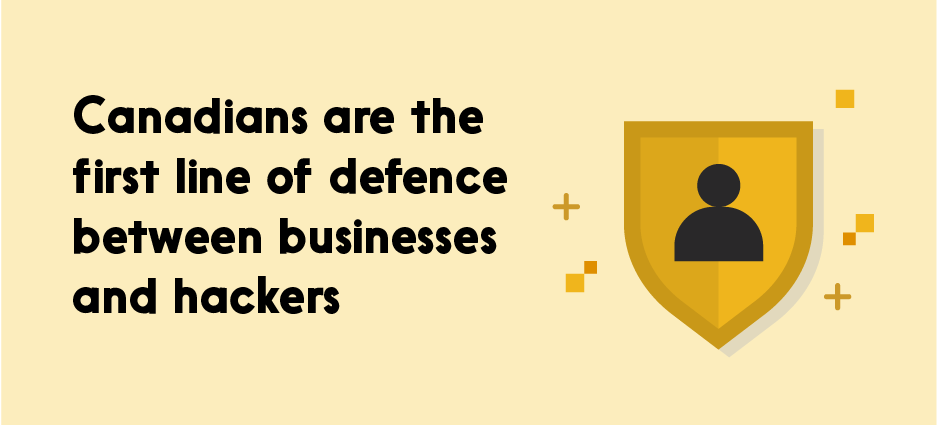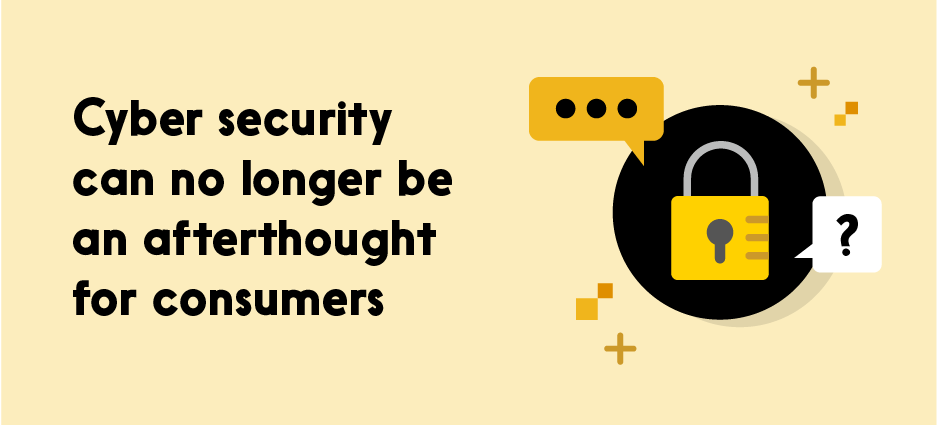According to our recent Cyber Security Study, Canadians recognize the need to be extra vigilant in guarding against cyber security threats that have become more pronounced as a result of COVID-19. However, they lack confidence that they’re armed to enter this environment of perceived increased risk and exposure.
The latest Interac research demonstrated that seniors are seen to be most at risk, with 81 per cent believing this demographic to be most vulnerable to cyber crime in Canada. The positive news is that nearly two in three Canadians (65 per cent) have taken action to learn more about cyber security risks. Despite this, confidence remains low and more education is needed to better identify threats, reduce exposure to risk and assist Canadians in personal data protection to help them become more cyber mature.
Canadians are the first line of defence between businesses and hackers. Consumers are well positioned to detect and prevent fraud, but organizations have a vital role to play to support and protect them against these risks. Security and convenience are no longer mutually exclusive. Consumers want better security without trading off convenience and quality of the client experience. A key focus of our work at Interac is to create an environment where consumers can transact with confidence: Our products and services are built with tools and technologies to help keep consumers safe.

These concerns parallel the continued evolution of cyber security attacks, particularly the shift toward identity theft. At the same time, consumer spending is migrating from in-person to the digital economy, further accelerated by the impacts of COVID-19. Fraudsters are taking advantage by monetizing identity-based credentials to unlock their substantial value within the digital space, where one does not need to physically present ID or payment credentials in person.
How everyone can guard against cyber crime in Canada
Despite these challenges, Canadians should feel confident using online services, knowing that they are not alone in defending themselves against cyber security attacks. There are additional steps they can take to better protect themselves to spot phishing scams and prevent unknown exposure to risk and fraudulent activity online. Ensuring Canadians can transact safely online, Interac offers the following recommendations:
Understand the attacker
Consumers are inundated with more online communications. This can leave them feeling overwhelmed and more susceptible to clicking on malicious links that would provide personal information to a fraudster. Cyber criminals are increasingly opportunistic during COVID-19, preying on people’s online vulnerabilities to harvest personal and banking credentials for use later. These synthetic IDs are then used to apply for credit, make online purchases and conduct other nefarious activity. Knowing what may be deemed valuable to a hacker allows you to see the warning signs when being asked for personal information online.
Cyber awareness is everyone’s responsibility
Many people and entities don’t believe these threats apply to them. Our Cyber Security Survey also revealed that, due to their minimal online activity, 24 per cent of Canadians have not taken steps to learn more about cyber security risks. Consumers must be extra vigilant, what appears harmless may in fact be part a scheme to steal valuable data.

Three steps to better data protection
If you have any doubt about an email asking for personal information or a notification of a money transfer or refund you weren’t expecting, stay alert and don’t feel pressured to respond quickly. It costs nothing to pause, and sometimes it costs your own money when you move too fast and don’t recognize the signs. There are many online resources — including those available at the Canadian Anti-Fraud Centre — to help you find out about the latest scams and what to look for. Consumers should always keep these tips in mind when they are online:
- Only engage with parties that you trust.
- Be extra vigilant when dealing with a new site and/or app until you establish a level of trust with the application or organization.
- Protect and use caution when sharing your personal information.
Accelerating the digital economy with confidence
Historically fraudsters have been focused on obtaining data including payment credentials, card numbers, and expiry dates. Many environmental improvements in the payment ecosystem have helped to make this data more secure, including innovations like Chip and PIN for payment cards and tokenization in the online space.
As the shift to the digital economy accelerates, the reality is that consumers and businesses must become more proactive with data protection. Cyber security can no longer be an afterthought for consumers. The good news is that Canadians are cyber security aware; however, leaders in security like Interac have a strong role to play in providing guidance to help consumers enhance their cyber literacy so they can continue to transact with confidence.
The Cyber Security Survey is based on a survey of 993 Canadians across the country, conducted September 3 to September 8, 2020.


